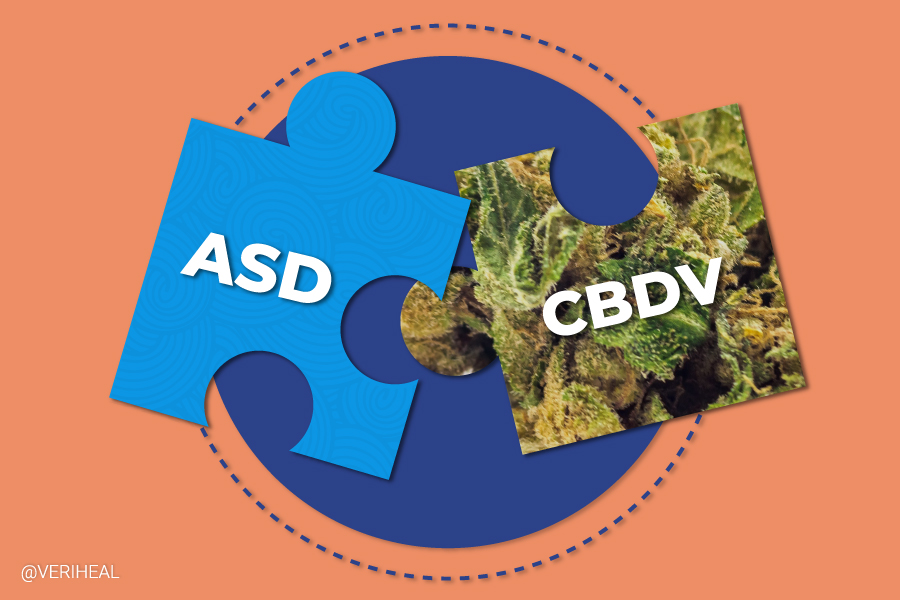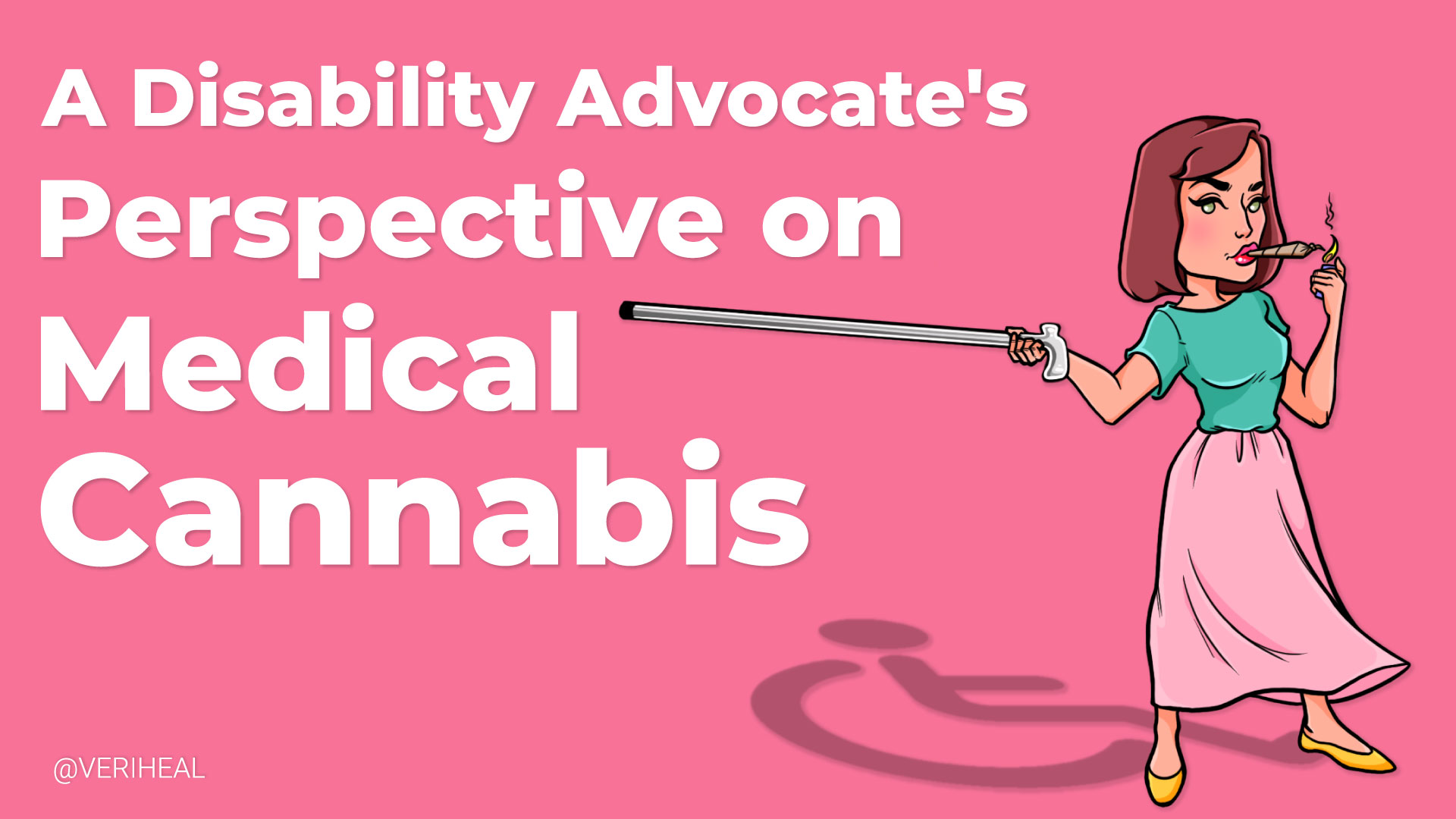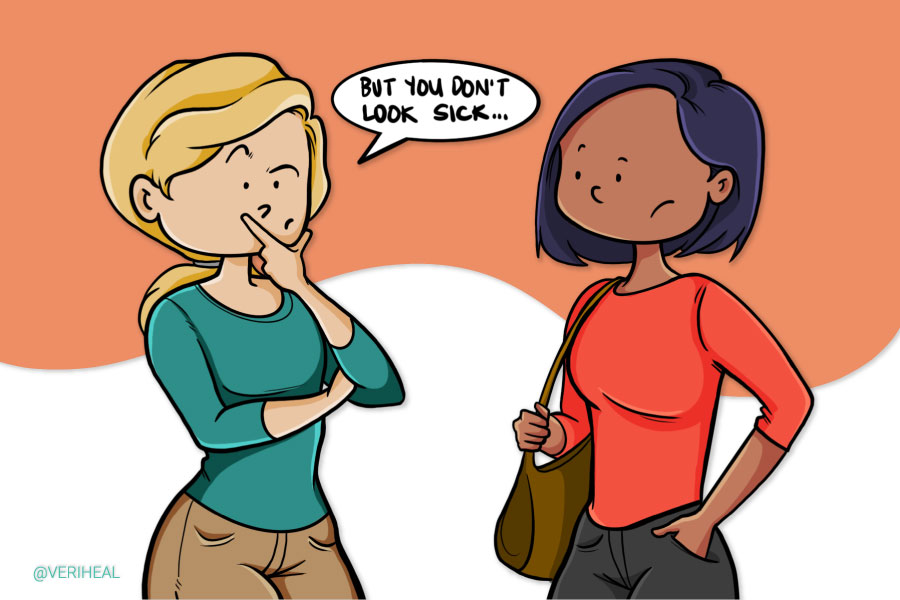What Do Studies Say About Cannabis and Autism Symptoms?
- Medical Cannabis Recommendations for ASD
- Thoughts to Keep in Mind
- Why Use Medical Marijuana for Autism Spectrum Disorder?
- What is Autism Spectrum Disorder?
- According to the Research
Autism spectrum disorder (ASD) is a complicated developmental and behavioral condition that typically begins early in childhood and is considered a lifelong condition. The symptoms involved often include developmental delays, difficulty regulating emotions, and social/communication struggles. Current research has shown that cannabis, with its cannabinoids that include cannabidiol (CBD), cannabidivarin (CBDV), and Δ9-tetrahydrocannabinol (THC) may help improve the quality of life of patients with autism.
Cannabis interacts with the body through the endocannabinoid system (ECS) and various other receptors (14). The ECS is made up of fat, or lipid-based neurotransmitters that are responsible for our perception of pain, inflammation, and other homeostatic functions. Cannabis begins its work by entering the body orally or through the lungs where it contacts cannabinoid receptors throughout the body. Through the activation of cannabinoid receptors CB1 and CB2, cannabis can help modulate the endocannabinoid system by influencing receptor activity, and increasing or decreasing the amounts of neurotransmitters such as anandamide (AEA) and 2-arachidonoylglycerol (2-AG).
The endocannabinoid system has been shown to be influential in the following (10):
- Controls emotional responses
- Behavioral reactivity to content
- Social interaction
- Mediates anxiety
- Influences circadian rhythms
In patients with ASD, it has been suggested that there is underlying dysregulation in the ECS, thought to be in its receptors or signaling. A study focusing on blood plasma levels of AEA has shown that there is an association of lower AEA levels in ASD patients (15). AEA is an endocannabinoid signaling molecule and can be directly boosted in the body with medical marijuana (11).
There are nerve receptors in the brain that produce a protein called neuroligin-3 (NLGN3) in the space between neurons, called the synapse. Research suggests that there are two mutations of NLGN3 that are associated with patients with ASD (16). Researchers believe that these genetic mutations are linked to behavioral differences in patients with ASD.
In addition to the receptor changes in NLGN3, genetic changes in other synaptic proteins like β-neurexins may also play a role in ASD and endocannabinoid signaling (26)(21).
Medical Cannabis Recommendations for ASD
When relieving autism symptoms using medical cannabis it is recommended to use products that contain a higher amount of CBD to THC (9). It is best to start with smaller doses and then gradually increase them. Smoking, edibles, tinctures, and oils are all possible delivery methods. If you have autistic children, it is recommended to speak with a pediatrician or family doctor before giving them cannabinoids for any health concern or reason. It is generally best to use tinctures or oils that can easily be dropped into their mouth.
Thoughts to Keep in Mind
It is important to discuss using cannabis plant or CBD-only products with your doctor or pediatrician before beginning treatment as they can interact with certain types of medications, especially in patients who are taking certain types of medications for seizures.
In addition, it is important to note that the American Academy of Pediatrics (AAP) is opposed to using cannabis products in children and adolescents ages 0-21 because of the possible negative health and brain development effects (24). In adolescence, it can increase the risk of developing future psychotic symptoms. Keep in mind the long-term effects of cannabinoids and cannabis extracts are yet unknown, particularly in special populations like children (17).
If you are considering using CBD-only products please keep in mind that they are not regulated by the U.S. Food and Drug Administration (FDA). Therefore not all products are made the same or contain the same amounts of cannabinoids. Please check out our complete CBD guide for more guidance on choosing safe products.
Why Use Medical Marijuana for Autism Spectrum Disorders?
Cannabis products are being used to treat a variety of medical purposes ranging from epilepsy to post-traumatic stress disorder (PTSD). For patients with an ASD diagnosis, the reasons for using cannabis are widely varied as well. Many patients with autism may see benefits using cannabis and CBD for improvements in the following (9):
- Quality of life improvements
- Mood improvements
- Reduction in seizures
- Improved sleep
- Improved ability to concentrate
- Improved restlessness
- Reduced agitation
- Reduction in rage attacks/meltdowns
- Decreased self-injury
- Improved communication
- Reduction in anxiety
What Is Autism Spectrum Disorder?
Autism spectrum disorder (ASD) is a developmental disability that affects children into adulthood. It causes social, communication, and behavioral challenges (25). People who have autism may communicate, interact, behave, and learn differently than other people. Some people with ASD who think or problem-solve differently may need significant support for daily living activities while others may be intellectually gifted, or require little support. It typically begins in the first three years of life and is considered a lifetime disorder, though many children with it may see improvements over time (27).
An ASD diagnosis is much different than it was several years ago. It includes conditions that used to be separate diagnoses, but we now understand are related. Autistic disorder, Asperger syndrome, and pervasive developmental disorder not otherwise specified (PDD-NOS) are now included in Autism Spectrum Disorder. If you think you or your child may have ASD, it is important to consult with a neuropsychologist who is trained in ASD and other learning disabilities to get a complete evaluation and diagnosis. Early detection and appropriate management of ASD can make an enormous difference in the quality of life for both the patients and families. Typically, people with ASD have difficulty with social communication and interactions as well as repetitive behaviors or interests (27).
The following symptoms may also be present, though they do not always indicate autism spectrum disorder (27):
- Developmental delays in language, communication, movement, learning, or cognitive skills.
- Hyperactivity, impulsiveness similar to, but distinct from, attention deficit hyperactivity disorder (ADHD).
- Epilepsy or seizures
- Digestive issues
- Unusual mood or emotional reactions
- Anxiety, stress, or excessive worry
According to the Research
One observational study of 188 children saw success in using 30% CBD and 1.5% THC cannabis oil. After six months of treatment with cannabis oil, 30.1% of patients saw significant improvements and 53.7% of patients experienced moderate improvements in restlessness, rage attacks, and agitation (9). Only about 9% surveyed had no improvements. This study also tracked quality of life improvements with cannabis and CBD oil use that included improvements in sleep, concentration, positive mood, and an increase in the ability of children to dress and shower independently.
Most patients (53%) stayed on the same dosages of other prescriptions, but 34.3% actually needed to use fewer medications like antipsychotics, antiepileptics, antidepressants, and hypnotics and sedatives.
A 2021 study tested the effects of varying ratios of CBD and THC on mouse models of ASD. The researchers found that CBD-enriched oil with trace amounts of THC improved the mice subjects’ repetitive and anxious behaviors but had no influence on social deficits. Pure CBD oil, however, made no significant changes in the mice. THC oil decreased repetitive grooming behavior and significantly improved social behavior.
The study concluded that while physicians prefer non-intoxicating CBD for young ASD patients, results indicate that CBD alone is not beneficial for alleviating autism-related symptoms. Rather, “results suggest that THC-based medical cannabis oil is preferable for that purpose, since it improved InsG3680 Shank3 mutant mice’s social behavior in addition to decreasing their excessive grooming behavior.” Because of CBD’s anxiety-reducing effects and THC’s effects on social behavior, the researchers suggested that combined CBD/THC treatments may be most beneficial for ASD.
Though there are several studies focusing on the use of cannabis for autism spectrum disorder, the research is still in its infancy and carries mixed results. A 2019 review of cannabis studies and autism states that “Medical cannabis may provide the urgent support needed to address the unique core symptoms of ASD and improving quality of life (2).” In addition, there is growing evidence that CBDV may have the pharmacological potential to address many of the core symptoms of ASD, though more research is needed before advising doctors on treatment options for children and what the long-term health effects are.
Note: Veriheal does not intend to give this as professional medical advice. Do not attempt to self-diagnose or prescribe treatment based on the information provided on this page. Always consult a physician before making any decision on the treatment of a medical condition.
1. Agarwal, R., Burke, S. L., & Maddux, M. (2019). Current state of evidence of cannabis utilization for treatment of autism spectrum disorders. BMC psychiatry, 19(1), 328. https://www.ncbi.nlm.nih.gov/pmc/articles/PMC6819459/
2. Agarwal, R., Burke, S.L. & Maddux, M. Current state of evidence of cannabis utilization for treatment of autism spectrum disorders. BMC Psychiatry 19, 328 (2019). https://bmcpsychiatry.biomedcentral.com/articles/10.1186/s12888-019-2259-4
3. Aran, A., Harel, M., Cassuto, H., Polyansky, L., Schnapp, A., Wattad, N., Shmueli, D., Golan, D., & Castellanos, F. X. (2021). Cannabinoid treatment for autism: a proof-of-concept randomized trial. Molecular autism, 12(1), 6. https://www.ncbi.nlm.nih.gov/pmc/articles/PMC7860205/
4. Aran, A., Cassuto, H., Lubotzky, A., Wattad, N., & Hazan, E. (2019). Brief Report: Cannabidiol-Rich Cannabis in Children with Autism Spectrum Disorder and Severe Behavioral Problems-A Retrospective Feasibility Study. Journal of autism and developmental disorders, 49(3), 1284–1288. https://pubmed.ncbi.nlm.nih.gov/30382443/
5. Aran, A., & Cayam-Rand, D. (2020). Medical Cannabis in Children. Rambam Maimonides medical journal, 11(1), e0003. https://www.ncbi.nlm.nih.gov/pmc/articles/PMC7000154/
6. Araujo, D. J., Tjoa, K., & Saijo, K. (2019). The Endocannabinoid System as a Window Into Microglial Biology and Its Relationship to Autism. Frontiers in cellular neuroscience, 13, 424. https://www.ncbi.nlm.nih.gov/pmc/articles/PMC6759510/
7. Barchel, D., Stolar, O., De-Haan, T., Ziv-Baran, T., Saban, N., Fuchs, D. O., Koren, G., & Berkovitch, M. (2019). Oral Cannabidiol Use in Children With Autism Spectrum Disorder to Treat Related Symptoms and Co-morbidities. Frontiers in pharmacology, 9, 1521. https://www.ncbi.nlm.nih.gov/pmc/articles/PMC6333745/
8. Bar‐Lev Schleider, L., Abuhasira, R., & Novack, V. (2018). Medical cannabis: Aligning use to evidence‐based medicine approach. British Journal of Clinical Pharmacology, 84(11), 2458-2462. https://bpspubs.onlinelibrary.wiley.com/doi/full/10.1111/bcp.13657
9. Bar-Lev Schleider, L., Mechoulam, R., Saban, N. et al. Real life Experience of Medical Cannabis Treatment in Autism: Analysis of Safety and Efficacy. Sci Rep 9, 200 (2019). https://www.nature.com/articles/s41598-018-37570-y
10. Chakrabarti, B., Persico, A., Battista, N., & Maccarrone, M. (2015). Endocannabinoid Signaling in Autism. Neurotherapeutics : the journal of the American Society for Experimental NeuroTherapeutics, 12(4), 837–847. https://www.ncbi.nlm.nih.gov/pmc/articles/PMC4604173/
11. Deutsch, D. G. (2016). A personal retrospective: Elevating ANANDAMIDE (AEA) by Targeting fatty Acid Amide Hydrolase (FAAH) and the fatty acid binding Proteins (FABPs). Frontiers in Pharmacology, 7. https://www.frontiersin.org/articles/10.3389/fphar.2016.00370/full
12. Fusar-Poli, L., Cavone, V., Tinacci, S., Concas, I., Petralia, A., Signorelli, M. S., Díaz-Caneja, C. M., & Aguglia, E. (2020). Cannabinoids for People with ASD: A Systematic Review of Published and Ongoing Studies. Brain sciences, 10(9), 572. https://www.ncbi.nlm.nih.gov/pmc/articles/PMC7563787/
13. Ganesh, A., & Shareef, S. (2020). Safety and Efficacy of Cannabis in Autism Spectrum Disorder. Pediatric neurology briefs, 34, 25. https://www.ncbi.nlm.nih.gov/pmc/articles/PMC7759327/
14. Gonçalves, J., Rosado, T., Soares, S., Simão, A. Y., Caramelo, D., Luís, Â., Fernández, N., Barroso, M., Gallardo, E., & Duarte, A. P. (2019). Cannabis and Its Secondary Metabolites: Their Use as Therapeutic Drugs, Toxicological Aspects, and Analytical Determination. Medicines (Basel, Switzerland), 6(1), 31. https://www.ncbi.nlm.nih.gov/pmc/articles/PMC6473697/
15. Karhson, D. S., Krasinska, K. M., Dallaire, J. A., Libove, R. A., Phillips, J. M., Chien, A. S., . . . Parker, K. J. (2018). Plasma anandamide concentrations are lower in children with autism spectrum disorder. Molecular Autism, 9(1). https://molecularautism.biomedcentral.com/articles/10.1186/s13229-018-0203-y
16. Krueger, D., & Brose, N. (2013). Evidence for a common endocannabinoid-related pathomechanism in autism spectrum disorders. Neuron, 78(3), 408-410. https://www.cell.com/neuron/fulltext/S0896-6273(13)00361-9?_returnURL=https%3A%2F%2Flinkinghub.elsevier.com%2Fretrieve%2Fpii%2FS0896627313003619%3Fshowall%3Dtrue
17. Kuepper, R., Van Os, J., Lieb, R., Wittchen, H., Hofler, M., & Henquet, C. (2011). Continued cannabis use and risk of incidence and persistence of Psychotic SYMPTOMS: 10 YEAR follow-up cohort study. BMJ, 342(Mar01 1), D738-D738. https://www.bmj.com/content/342/bmj.d738
18. Lafee, S. (2018, April 28). Study to explore whether cannabis compound eases severe symptoms of autism. Retrieved August 19, 2021, from https://health.ucsd.edu/news/releases/pages/2018-04-26-study-to-explore-whether-cannabis-compound-eases-severe-symptoms-of-autism.aspx
19. Loss, C. M., Teodoro, L., Rodrigues, G. D., Moreira, L. R., Peres, F. F., Zuardi, A. W., Crippa, J. A., Hallak, J., & Abílio, V. C. (2021). Is Cannabidiol During Neurodevelopment a Promising Therapy for Schizophrenia and Autism Spectrum Disorders?. Frontiers in pharmacology, 11, 635763. https://www.ncbi.nlm.nih.gov/pmc/articles/PMC7890086/
20. Medical cannabis Resources. (n.d.). Retrieved August 19, 2021, from https://pathfindersforautism.org/medical-cannabis-resources/
21. Russo, E. B. (2016). Clinical endocannabinoid deficiency Reconsidered: Current research supports the theory in Migraine, fibromyalgia, Irritable Bowel, and OTHER Treatment-Resistant Syndromes. Cannabis and Cannabinoid Research, 1(1), 154-165. https://www.liebertpub.com/doi/10.1089/can.2016.0009
22. Siniscalco, D., Sapone, A., Giordano, C., Cirillo, A., de Magistris, L., Rossi, F., Fasano, A., Bradstreet, J. J., Maione, S., & Antonucci, N. (2013). Cannabinoid receptor type 2, but not type 1, is up-regulated in peripheral blood mononuclear cells of children affected by autistic disorders. Journal of autism and developmental disorders, 43(11), 2686–2695. https://www.researchgate.net/publication/236181731_Cannabinoid_Receptor_Type_2_but_not_Type_1_is_Up-Regulated_in_Peripheral_Blood_Mononuclear_Cells_of_Children_Affected_by_Autistic_Disorders
23. Trauner, D., MD. (2019). The Effects of Cannabidiol (CBD) on Symptoms of Severe Autism. Retrieved August 19, 2021, from https://www.cmcr.ucsd.edu/index.php/background/studies/active-studies/123-trauner-autism
24. The impact of marijuana policies on youth: Clinical, research, and legal update. (2015). PEDIATRICS, 135(3), 584-587. https://pediatrics.aappublications.org/content/135/3/584
25. What is autism spectrum disorder? (2020, March 25). Retrieved August 19, 2021, from https://www.cdc.gov/ncbddd/autism/facts.html
26. Anderson, G. R., Aoto, J., Tabuchi, K., Földy, C., Covy, J., Yee, A. X., Wu, D., Lee, S. J., Chen, L., Malenka, R. C., & Südhof, T. C. (2015). β-Neurexins Control Neural Circuits by Regulating Synaptic Endocannabinoid Signaling. Cell, 162(3), 593–606. https://www.ncbi.nlm.nih.gov/pmc/articles/PMC4709013/
27. Centers for Disease Control and Prevention. (2021, March 29). Signs and symptoms of autism spectrum disorders. Centers for Disease Control and Prevention. https://www.cdc.gov/ncbddd/autism/signs.html

















